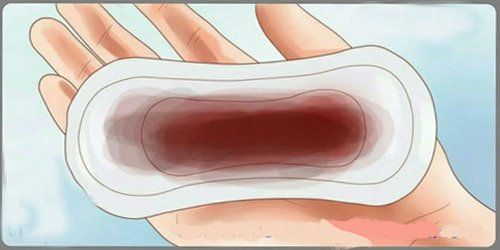Menstrual disorders after miscarriage can cause confusion for mothers and worry about their health in subsequent pregnancies. So what is menstrual disorder after miscarriage, and is there any way to improve it?
1. Problems related to miscarriage
Miscarriage can be caused by viruses such as herpes, rubella, etc., or by disorders due to some abnormalities, such as chromosomal abnormalities, mendelian genetics, or deficiencies in the luteal phase.
Causes of miscarriage can include immune abnormalities, major trauma, or abnormalities related to the uterus such as uterine fibroids, ovarian adhesions, etc. However, these causes are usually unclear, so it is difficult for women to recognize them easily.
Mothers who are at high risk of miscarriage include: mothers who are over 35 years old, have a history of previous miscarriages, smoke, use drugs or stimulants, or have some chronic diseases such as high blood pressure, diabetes, thyroid disorders, etc.
2. Signs of menstrual disorders after miscarriage
Menstrual disorders after miscarriage are very clearly manifested, including:
- The phenomenon of irregular menstruation after miscarriage. The pregnancy process with changes in endocrine hormones tends to increase. However, after miscarriage, the amount of this hormone suddenly decreases. This continuous change makes it impossible for the body to adapt and respond to the increase and decrease of hormones, and it takes time for the woman to recover. Sometimes during this time, menstruation will be irregular; it can be more or less than normal.
- The phenomenon of menorrhagia after miscarriage. After this process, the menstrual cycle can last longer, continuously for more than 7 days, which is considered menorrhagia. Signs of menorrhagia indicate that you may have menstrual disorders after a miscarriage, and at this time the uterus has not recovered. The phenomenon of menorrhagia after a miscarriage not only causes inconvenience and discomfort for women but also has potential risks of causing infections or diseases related to gynecology.
- The phenomenon of amenorrhea after a miscarriage. After a miscarriage, in contrast to the phenomenon of menorrhagia, amenorrhea may also occur, with menstruation not returning after 4 to 6 weeks. Amenorrhea for a long time can cause serious effects on subsequent pregnancies. Therefore, women need to see doctors for timely advice and treatment.
- The phenomenon of scanty menstruation after a miscarriage. After a miscarriage, the ovaries encounter many problems, along with the body lacking nutrients and not having time to recover, so these can be risk factors for scanty menstruation. Menstrual disorders with low menstrual flow are also common with miscarriage.

3. Causes of menstrual disorders after miscarriage
There can be many factors that cause menstrual disorders after miscarriage and these factors include psychology, hormones, diet, etc.
- Psychological factors: After a miscarriage, women will be in great shock. They are not only sad and tired but also feel anxious and pressured for the next pregnancy. And so will unintentionally inhibit the activity of the pituitary gland, causing hormonal disorders and menstrual disorders after miscarriage.
- Hormonal factors: During pregnancy, hormones in the body increase with the function of helping to ensure a healthy pregnancy. But when having a miscarriage, the amount of hormones suddenly decreases, causing the body to lose hormonal balance, leading to changes in the cycle as well as the ovulation period, causing menstrual disorders. In addition, miscarriage also directly damages the uterus and ovaries and affects ovulation time, causing menstrual disorders.
- Nutrition and rest factors: After a miscarriage, if the diet does not provide enough nutrients for the woman, it can cause menstrual disorders. Because after this process, the body is severely deficient in nutrients, accompanied by reduced resistance due to the recent incident. Moreover, women who have had a miscarriage can overwork or exercise vigorously, causing the abdominal muscles to contract and strongly impact the uterus. The uterus at this stage is weak, so it is easy to cause effects on the menstrual cycle.
- Factors related to gynecological infections after a miscarriage: After a miscarriage, the woman's private area is always moist, and the cervix is dilated, along with a variety of vaginal discharge, these factors create favorable conditions for bacteria to invade and develop, causing inflammation or fungus in the private area. At this stage, women do not practice good hygiene and active treatment; otherwise, it may increase the risk of gynecological diseases such as cervicitis, endometriosis, etc. causing menstrual disorders.
4. The danger level of menstrual disorders after miscarriage
After the miscarriage and menstruation return to normal, women can rest assured about their reproductive health. However, prolonged menstrual disorders after a miscarriage can cause serious problems to women's health, such as weakness, imbalance, etc., or can be clearly seen on the skin, such as dark skin, pale skin, etc., or can cause severe anemia. Because after a miscarriage, women lose a large amount of blood, the amount of iron stored in the blood is not enough to regenerate red blood cells, and menstrual disorders will make women feel dizzy and tired. Or people are unlikely to be able to get pregnant the next time. Because menstrual disorders can increase the risk of uterine inflammation, causing the uterine lining to thin, the risk of infertility is high, and it is difficult to fulfill the role of a mother.

5. Ways to help limit menstrual disorders after miscarriage
Menstrual disorders after miscarriage can be unavoidable for some women, but you should take some steps to help limit the severity of this condition.
Take good care of the patient's health: This is considered a very important stage because when a woman has a miscarriage, her body is gradually weakening. Therefore, a woman's body needs time to recover. To do this, a woman needs to build a healthy lifestyle, a reasonable diet, and maintain a comfortable spirit.
- Take care of nutrition with full and diverse nutrients with many types of foods such as green vegetables, fruits, and seafood to help balance hormones and maintain a reasonable weight.
- Drink plenty of water, especially warm water, to help purify and detoxify the body.
- To ensure good sleep quality, patients should go to bed early before 10 pm, and should not stay up late to affect their health.
- Do light work, and have a reasonable rest regimen, should not do heavy work and overwork.
- Do exercises, read books, listen to music, etc. to create a comfortable and pleasant mood.
In addition, women should also have regular check-ups to prepare for good health for the next pregnancy. Regular gynecological examinations also help women detect early abnormalities related to the reproductive organs, especially the uterus and ovaries.
Women with a history of miscarriage need to be careful in subsequent pregnancies. To maximize the chance of conception and ensure a healthy pregnancy, before planning to get pregnant, both husband and wife should have a reproductive health check-up for 3-5 months. You will be examined to assess your fertility, and sexuality, screen for sexually transmitted diseases, and screen for genetic diseases. In particular, this examination process will be able to detect early causes that can lead to infertility and infertility so that early intervention measures can be taken. Doctors will also advise on the best time to give birth and measures to give birth to healthy, intelligent children.
To arrange an appointment, please call HOTLINE or make your reservation directly HERE. You may also download the MyVinmec app to schedule appointments faster and manage your reservations more conveniently.













